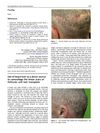 May 2020 in “Plastic and Aesthetic Research”
May 2020 in “Plastic and Aesthetic Research” Endoscopic facial rejuvenation is key for natural, long-lasting results with less scarring and quick recovery.
[object Object] 
The document is a detailed guide on skin conditions and treatments for dermatologists.
 35 citations,
June 2005 in “The Milbank Quarterly”
35 citations,
June 2005 in “The Milbank Quarterly” The conclusion is that formalizing how past decisions influence current health technology assessments could improve the credibility and defense of coverage decisions.
 14 citations,
November 2006 in “Current Medicinal Chemistry”
14 citations,
November 2006 in “Current Medicinal Chemistry” New treatments for enlarged prostate are being developed to be more effective and have fewer side effects.
 November 2013 in “John Wiley & Sons, Ltd eBooks”
November 2013 in “John Wiley & Sons, Ltd eBooks” The document concludes that accurate diagnosis of male and female gonadal disorders is crucial for effective treatment and better patient outcomes.
 3 citations,
January 2024 in “Signal transduction and targeted therapy”
3 citations,
January 2024 in “Signal transduction and targeted therapy” Lymphatic vessels are essential for health and can be targeted to treat various diseases.
 9 citations,
May 2005 in “Annales de dermatologie et de vénéréologie”
9 citations,
May 2005 in “Annales de dermatologie et de vénéréologie” Oral zinc and topical steroids can effectively treat chronic scalp pustules and hair loss in elderly patients.
 January 2017 in “Acta dermato-venereologica”
January 2017 in “Acta dermato-venereologica” The congress showed that psychological therapy can help skin condition patients, social media affects acne stigma, education improves atopic dermatitis, and patient satisfaction in dermatology is high, especially with good doctor engagement.
 2 citations,
January 2019 in “Springer eBooks”
2 citations,
January 2019 in “Springer eBooks” Segmental Vitiligo is a stable, early-onset form of vitiligo that responds well to early treatment and is ideal for repigmentation studies.
86 citations,
April 2009 in “Journal of anatomy” Hard skin features like scales, feathers, and hair evolved through specific protein changes in different animal groups.
2 citations,
January 2022 in “Annals of Dermatology” Treatment type and patch size affect hair regrowth patterns in alopecia areata.
 9 citations,
April 2018 in “Journal of trace elements in medicine and biology”
9 citations,
April 2018 in “Journal of trace elements in medicine and biology” Hair analysis can show nutritional status and environmental exposure, with phosphorus being very stable in hair and differences found based on gender and conditions like depression and autism.
November 1968 in “Journal of the American Pharmaceutical Association”  7 citations,
May 2010 in “JEADV. Journal of the European Academy of Dermatology and Venereology/Journal of the European Academy of Dermatology and Venereology”
7 citations,
May 2010 in “JEADV. Journal of the European Academy of Dermatology and Venereology/Journal of the European Academy of Dermatology and Venereology” White hair follicles in vitiligo have fewer and less functional melanocytes.
235 citations,
July 1999 in “Journal of biological chemistry/The Journal of biological chemistry” Human hair is made up of different keratins, some strong and some weak, with specific types appearing at various stages of hair growth.
1 citations,
January 2022 in “Clinical dermatology review” A young man's cheek papule was identified as a benign hair follicle tumor using a skin surface microscope.
 18 citations,
September 2011 in “Livestock science”
18 citations,
September 2011 in “Livestock science” Maternal Nano-Se supplements improve fetal hair follicle development in cashmere goats.
 November 2021 in “Authorea (Authorea)”
November 2021 in “Authorea (Authorea)” PRP treatments and hair transplantation may be linked to the progression of pseudolymphoma to lymphoma.
[object Object]  3 citations,
August 2020 in “Journal of Cosmetic Dermatology”
3 citations,
August 2020 in “Journal of Cosmetic Dermatology” Topical nitroglycerin spray effectively prevents scalp necrosis in hair transplant patients.
 1 citations,
January 2008 in “Springer eBooks”
1 citations,
January 2008 in “Springer eBooks” Hair follicle stem cells can turn into many cell types and may help repair nerve damage and have other medical uses.
 10 citations,
May 2012 in “Journal of Plastic Reconstructive and Aesthetic Surgery”
10 citations,
May 2012 in “Journal of Plastic Reconstructive and Aesthetic Surgery” Beard hair can effectively hide hair transplant scars.
18 citations,
January 2019 in “European journal of histochemistry” Cattle skin has leptin which might control skin and hair growth.
 4 citations,
May 2017 in “Hair transplant forum international”
4 citations,
May 2017 in “Hair transplant forum international” Using implanters in hair transplants can improve outcomes and cause less damage to hair follicles.
 13 citations,
July 2012 in “Dermatologic Surgery”
13 citations,
July 2012 in “Dermatologic Surgery” Platelet-rich plasma (PRP) may help promote hair growth and improve graft survival after hair transplantation, but more research is needed to confirm its effectiveness and determine the best dosage.
Melatonin improves tomato root growth and plant health at certain levels by affecting genes and hormones but can damage roots at high levels.
11 citations,
January 2018 in “IET Nanobiotechnology” The scaffolds significantly sped up wound healing in dogs and were safe.
 October 2023 in “Pathology”
October 2023 in “Pathology” A woman had a rare reaction to ear piercing that caused earlobe swelling, which was best treated by removing the piercing and not re-piercing.
 January 1993 in “Journal of Dermatological Treatment”
January 1993 in “Journal of Dermatological Treatment” Most people who volunteered for a health study had medical issues, showing the need for careful screening before trials.
 4 citations,
January 2008 in “Facial Plastic Surgery”
4 citations,
January 2008 in “Facial Plastic Surgery” Improve skin paddle appearance after head and neck reconstruction using tissue expansion, rearrangement, and flaps.

Variant G of the KRTAP20-1 gene improves wool curliness in Chinese Tan sheep.






















